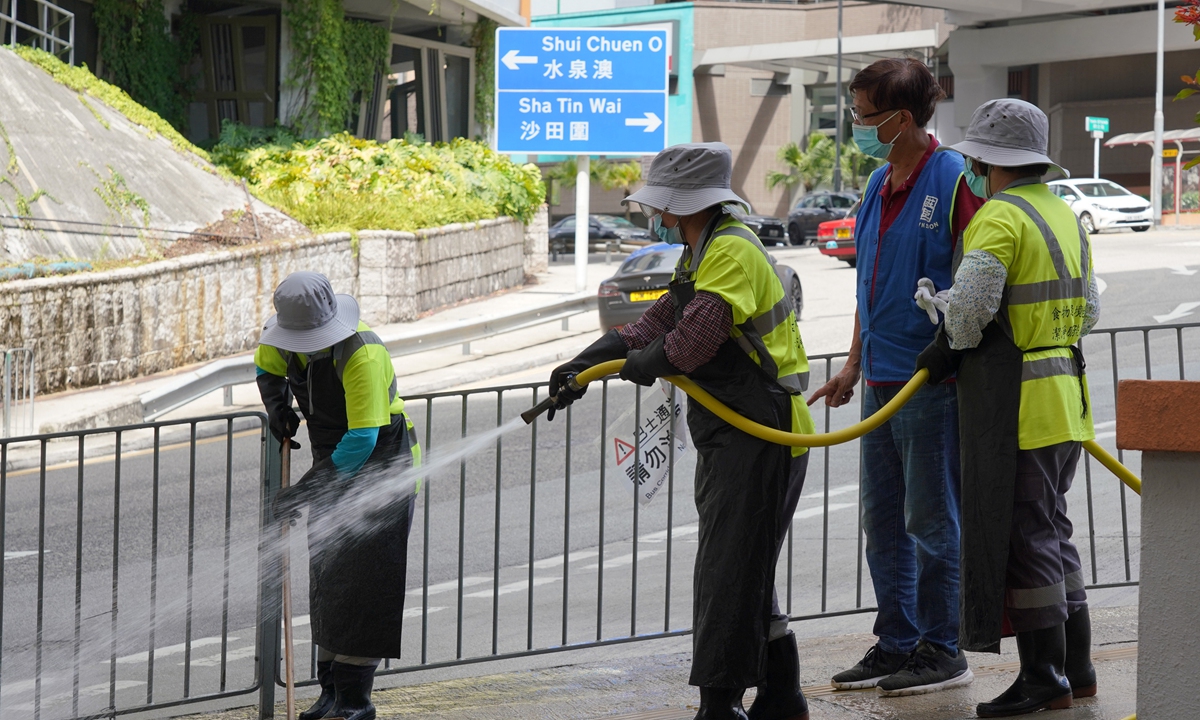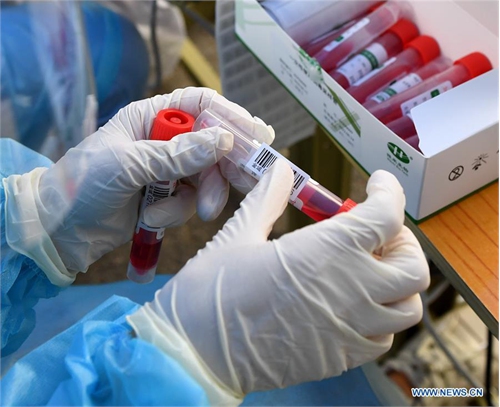
Cleaners spray disinfectant fluid to clean the street at Sha Tin, Hong Kong on Saturday. A spike in cases indicates the city has been hit by a third wave of COVID-19. On Sunday, Hong Kong reported 38 newly confirmed cases. Photo: cnsphoto
The Hong Kong health authority reported 73 new COVID-19 cases on Monday after the daily surge recorded 108 cases the day before, prompting some experts and the public to worry whether the city would impose a lockdown if the situation cannot be brought under control soon.
Total confirmed cases in Hong Kong have reached 1,959 as of Monday afternoon, the health authority said.
Hong Kong microbiologist Yuen Kwok-yung said in a local radio show that if COVID-19 cases continue to geometrically grow 7-14 days later despite strengthened prevention measures, the city would need to restrict residents' mobility like a lockdown, Reuters reported Monday.
People now can enter or exit Hong Kong with quarantine period and other epidemic control measures.
It is possible that the Hong Kong government would issue mobility restrictions if the situation continues to worsen, Hong Kong Executive Chief Carrie Lam said at a press conference on Sunday.
However, experts reached by the Global Times remain confident in the city's capacity to control the outbreak, as the local government has announced the resumption of strict anti-epidemic measures, including requiring local residents to wear masks in public transport, to prevent infections.
Keiji Fukuda, director and clinical professor of the School of Public Health at the University of Hong Kong, told the Global Times on Monday in an email that he doesn't believe the current situation in Hong Kong requires a lockdown.
In large cities like Hong Kong, there are likely going to be a number of unidentified cases and transmissions, Fukuda said.
He explained that "if control measures, such as social distancing, masks, and hand washing are maintained at a certain level, it is possible to keep the number of cases down. This is possible in Hong Kong because the border and travel measures are pretty tight."
Jin Dongyan, a professor at the School of Biomedical Sciences of the University of Hong Kong, echoed Fukuda, saying that Hong Kong won't fall into such a severe situation and he remains "cautiously optimistic."
Jin told the Global Times on Tuesday the rise in COVID-19 cases in Hong Kong is a result of expanding tests. When the tests reach a higher scale and virus transmission is prevented, the number of infections in the city is expected to decline.
"This wave of the epidemic is a result of anti-epidemic fatigue among the public. Following the most recent strict measures by the HKSAR, the effects will gradually surface. Hong Kong, as an international financial hub, has high interactions with the outside world. So, it is unrealistic for Hong Kong to be locked down," Jin said.
It is within the capability of hospitals in Hong Kong to handle 100 patients daily, Jin noted.
Some elderly people at nursing homes may bring certain pressure to hospitals since they might be hospitalized a longer time. But those with mild symptoms could be transferred to makeshift wards, which will relieve pressure on hospitals, he said.
If Hong Kong faces a "breakdown" in handling COVID-19, Jin said the city could seek the support of the central government.



